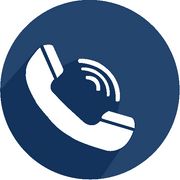5 Reasons Why a Cloud Phone System is a MUST for Sales Reps in 2020

Whether they’re selling swimming pools or semiconductors, what do the world’s most successful sales reps have in common? They’re self-motivated. They’re driven. They’re persistent. They’re persuasive. They’re competitive. And perhaps most importantly: they rely on potent (and beloved) tools like a cloud phone system to help usher customers forward across the buyer’s journey. If you want to elevate your organization’s sales reps in 2020 and beyond — so that they’re consistently surpassing targets instead of struggling to meet them — then here are 5 reason why adding a cloud phone system ASAP is the way to go:
1. Dramatically Improve Response Times
Research has shown that customers are 35-50% more likely to purchase from the business that responds to them first. A cloud phone system lets sales reps make and receive calls regardless of where they’re located or when they’re working. For example, at the end of the business day sales reps can forward calls to their smartphone, home office landline, or after-hours contact center. This leads to shorter sales cycles, more closed deals, and more loyal customers.
2. Seamlessly Transfer Live Calls Between Devices
Few things annoy customers more — and can convince them to head to a competitor — then when a sales rep says in the middle of a conversation: “I’m on my way in (or out) of the office, can I call you back in a few minutes?” With a cloud phone system, sales reps can seamlessly transfer live calls between devices and stay connected with customers. For example, sales reps can answer a call with the IP phone on their desk, transfer it to their mobile phone as they head outside to the parking lot, and transfer it again to their car’s Bluetooth system as they drive. The end result? Instead of becoming annoyed and possibly heading elsewhere, customers remain impressed and engaged.
3. Pick-Up Voicemails On-the-Go
Even the most responsive sales reps can’t be available 24/7 (though some of them wish they could!). That means voicemail needs to enter the picture. With a conventional phone system, sales reps typically need to call their voicemail box to check messages — which is not just tedious, but some customers may wait hours or (in the case of weekends and holidays) days to get a call back. But with a cloud phone system, sales reps instantly get a push notification on their desktop and smartphone to let them know that a voicemail is waiting. What’s more, sales reps can listen to the voicemail as an audio file and prioritize their response accordingly.
4. Collaborate with Colleagues While Talking with Customers
Most customers don’t like being placed on hold — and a few of them won’t tolerate it at all. Yet even the most informed and prepared sales reps don’t have all of the information at their fingertips, or in their (vast) memories. With a cloud phone system, sales reps can connect through instant messaging with colleagues to get the advice or answers they need, while they’re still on the phone with customers. This makes a big difference to customers who feel personally cared for instead of “shuffled around in the system.”
5. Establish Best Practices and Identify Training Opportunities
Last but not least: sales managers are constantly looking for ways to improve results at both the individual and team levels. A cloud phone system provides a wide range of metrics and key performance indicators (KPIs) to help establish best practices and identify training opportunities. For example, analyzing call data over a sufficient period of time could reveal that sales reps who reach out to customers several times a month and have shorter conversations are ultimately more successful vs. sales reps who reach out to customers a few times a month and have longer conversations.
Ready to make 2020 your sales team’s BEST YEAR EVER?
Contact Carolina Digital Phone at (336) 544-4000 and schedule your free live guided demo, delivered in-person at your location or over-the-web.
Our experts will show you the ins and outs of our solution and answer all of your questions. We LOVE helping sales reps and sales teams succeed!!!
About the Business
Have a question? Ask the experts!
Send your question


